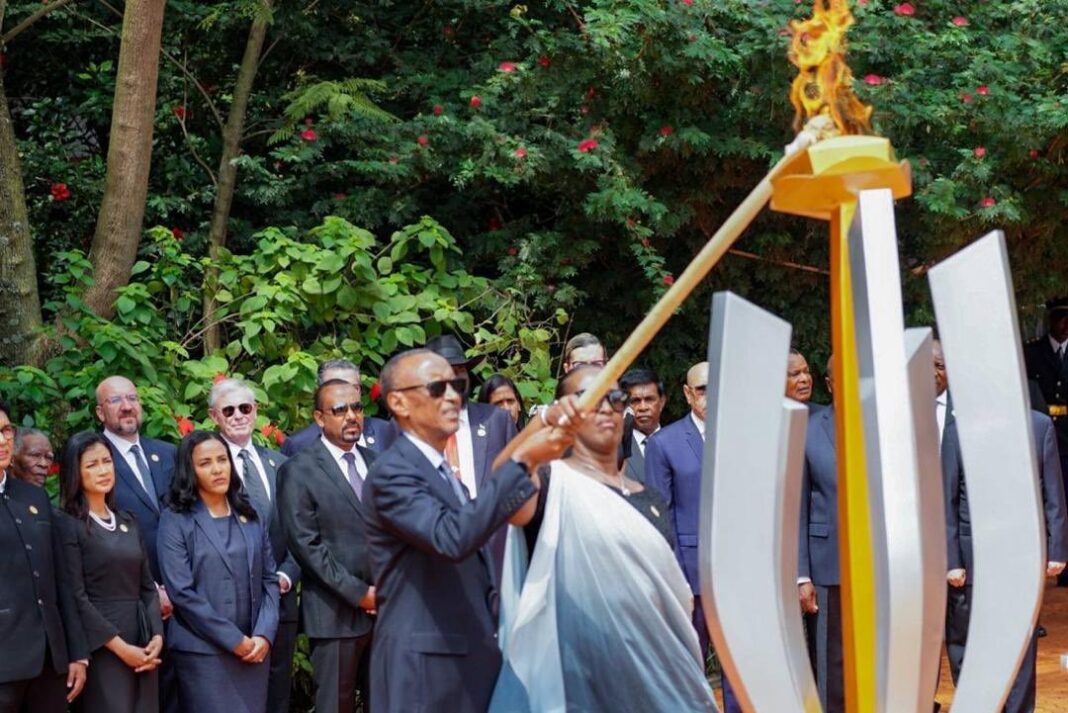Johnathan Paoli
President Ramaphosa joined a procession led by Rwandan President Paul Kagame for a wreath-laying ceremony at the Kigali Genocide Memorial on Sunday that will be followed by a National Commemoration Ceremony at the BK Arena, marking 30 years since the Genocide against the Tutsi, which began on 7 April 1994.
Kagame hosted African heads of state, the Chairperson of the African Union Commission and the President of the European Council.
South Sudan President Salva Kiir, Czech Republic President Petr Pavel, President Andry Rajoelina of Madagascar, Ethiopia’s Prime Minister Abiy Ahmed, Mauritanian President Mohamed Ould Ghazouani, former South African president Thabo Mbeki, French Foreign Minister Stéphane Séjourné and Israel’s President Isaac Herzog were among the visiting dignitaries.
The ceremony commemorated the launching of a 100-day “killing spree”, in which members of the Tutsi minority and Hutu moderates were slaughtered.
The assassination of Hutu President Juvenal Habyarimana on the night of April 6, when his plane was shot down over Kigali, triggered the rampage by armed Hutu men and the “Interahamwe” militia with victims being shot, beaten or hacked to death in killings fueled by vicious anti-Tutsi propaganda broadcast on TV and radio.
United Nations(UN) figures indicated that at least 250,000 women were raped and 800,000 murdered, who were largely Tutsis but also moderate Hutus.
Kagame, during his address, said the international community failed his country during the 1994 genocide, but that since then, the country has found its footing despite scars of the violence remaining.
The Rwandan president thanked fellow African countries including Uganda, Ethiopia and Tanzania for their assistance in ending the genocide, and said that many of the countries represented here sent their sons and daughters to serve as peacekeepers in Rwanda.
African Union chief Moussa Faki Mahamat said that even fellow African nations could not prove that their hands were clean in light of their failure to help sooner.
“No one, not even the African Union, can exonerate themselves from their inaction… Let us have the courage to recognise it, and take responsibility for it,” Mahamat said.
Karel Kovanda, a former Czech diplomat who was the first UN ambassador to publicly call the events of 1994 a genocide, nearly a month after the killings began, said the massacres should never be forgotten.
On arrival in Kigali on Saturday, Ramaphosa had a bilateral meeting with Kagame, and relations between the two countries were established in 1995, and further strengthened through the signing of a General Cooperation Agreement in 1999.
The President said since the inauguration of the Joint Cooperation Commission in Pretoria on 22 June 2001, significant progress was recorded in areas such as institution and capacity building, health and education, with South African companies investing in Rwanda.
Ramaphosa said it was important to join in the commemoration of the genocide that happened in the country thirty years ago, in light of the experiences both countries went through, and highlighted the development of relations, critical infrastructure and institution of SA in Rwanda.
He said despite the initiatives of development, challenges remained, but that the two presidents were currently working on solutions on issues including visa and transport.
Ramaphosa said both countries, as well as SADC in general should be assisted in instilling peace and bring the conflicts in the eastern DRC to an end, including actions from forces outside the area, specifically within Rwanda itself.
“I leave Rwanda with renewed vigour and intention that we should find a political solution to what is prevailing here. The people of DRC and Rwanda yearn for peace, therefore all of us should combine and work for peace,” he said.
The President said SA played a key role in supporting the processes aimed at peace and a ceasefire, with peace being the country’s calling card, inclusive of other processes that are ongoing and the interaction with all parties concerned.
Rwanda’s much larger neighbour the DRC did not send a representative to the ceremonies because relations between the two countries have sharply worsened in recent years caused by the presence of the Tutsi-led M23 rebel group in Congo.
The Rwandan government has denied allegations that it is arming Tutsi-led M23 rebels in the eastern DRC, and has accused the DRC of hosting a Hutu-led militia hostile to Rwanda.
South African opposition party the EFF has highlighted the concerning similarities between the Rwanda Genocide and what is currently happening in Palestine, with Gauteng Premier Candidate Mbuyiseni Ndlozi saying that just like then, the world was once again looking the other way in the face of crimes against humanity.
“In memory of the Rwandan Genocide, let us note that once more, the world is turning a blind eye on the people of Palestine, who face systematic extermination at the hands of the brutal Israeli apartheid regime. This is occurring with the full support of the USA, UK and EU,” Ndlozi said.
Sunday’s events mark the start of a week of national mourning, with Rwanda effectively coming to a standstill and national flags flown at half-mast.
Music in public places or on the radio will be prohibited, while sports events and movies are banned from TV broadcasts, unless connected to what has been dubbed “Kwibuka (Remembrance) 30”.
INSIDE POLITICS

